When I first got started homesteading, I had no idea how challenging it would be – or how rapidly our backyard garden and “just a few chickens” would grow into something that became a lifestyle and later, for us, a full-fledged business.
Today, on my farm, we have several large gardens, a 30” x 96” hoop house, 34 sheep, 16 pigs, and, depending on the time of year, anywhere from 70 and 300 chickens. That’s a lot to take care of!
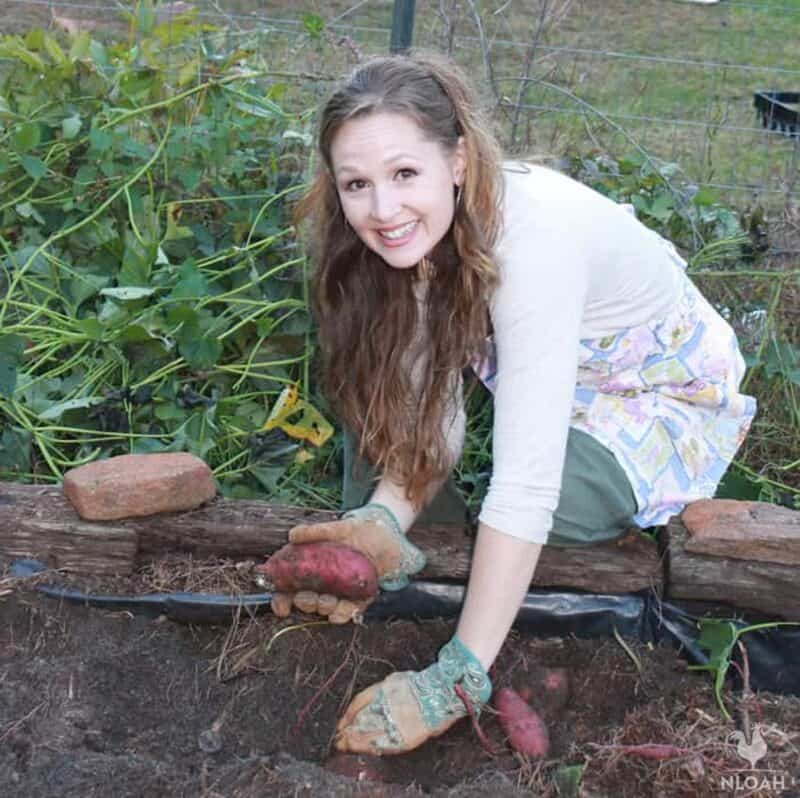
If only I’d had a list of “hacks” as we were first getting started, it would have been a much less daunting experience. So to help you in your journey, here is a list of 110 darn useful homesteading tips and tricks.
Start Small
Haha, easier said than done, I know! But you need to start small and set realistic goals. Consider setting one goal each year that you’d like to conquer, then go from there. Don’t go out and do everything all at once!
Find a Few Ways to Bring in Some Income
Homesteading takes a lot of time out of your day, no matter how small or large your homestead is. If you can turn at least a few of your homesteading activities into income generation, then it’s a good way to offset some of the time and money you spend on your farm.
Maybe you can sell a few eggs or tomatoes from your greenhouse – whatever the case, see if you can make some money.
Get Rid of as Much Debt as Possible
… and don’t go into more debt to sustain your homestead. While a bit of debt is okay, you want to avoid spending hundreds of thousands of dollars that you don’t have. There’s a lot of risk in homesteading, so don’t make it riskier by spending money you don’t already have
Lower Your Initial Expenses
This goes along with the last tip. Try to spend as little money as possible, at least until you’re able to start generating a bit of additional income from your farm.
If you can pay cash for your land, or at the very least, figure out ways you can save for other major expenses, like hot water, you’ll start off on a much better footing than if you had a ton of debt.
Don’t Worry Too Much About “Looks”
My first year or two of homesteading was very overwhelming because I was very focused on the fact that our plot of land didn’t look like much. For the first few years, it was all swamp and mud.
As the years have progressed and we have now lived on our land for five years, it is finally looking like the paradise it truly is! This lifestyle takes time to cultivate, and to do things correctly is a slow process – but worth it.
Take Things As They Come
When you have a homestead, you need to learn to be able to laugh at yourself! You often can’t control what happens and this lifestyle is undeniably unpredictable. Take it easy on yourself and don’t be too stressed about meeting every goal or timeline.
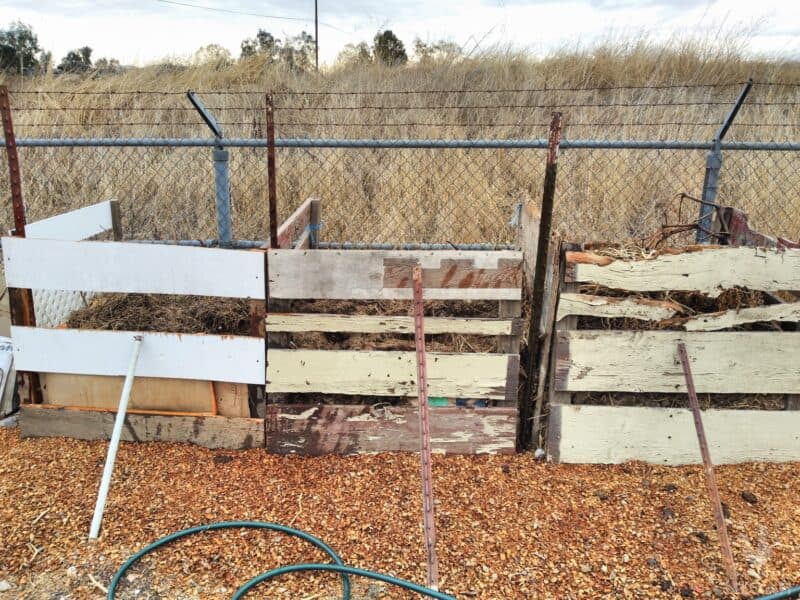
Start with a Kitchen Compost
Ok, that’s enough with the lofty aspirational tips! Here are some nitty-gritty ones. If you’re new to homesteading, consider starting with a kitchen compost.
This can easily be done in an apartment. Just save your food scraps and feed them to worms in a vermicomposting bin or add them to an outdoor compost pile. Free soil for the garden!
Eat a More Plant-Based Diet
An easy way to save money as you begin embracing this lifestyle of self-sufficiency is to cut some meat consumption out of your diet. It doesn’t totally have to go away, of course, but add some more plants into your meals (ideally those that you grew yourself) and you’ll reap the benefits.
Diversity is Key in the Garden
Here are some of the easiest plants you can grow in your garden. I recommend starting small the first year, and adding a few new plants each year.
Incorporate ACV
Add some apple cider vinegar to your homestead. These are some potential uses for this miracle solution – they’re essential when you’re trying to live off the grid.
Start Seeds in Containers You Already Have Lying Around
Starting seeds is a great way to save money on your plants. While a packet of seeds normally costs just a few dollars and will yield you hundreds of plants, a six-pack of seedlings costs twice as much! Here are some ways you can make the most of items you already have.
Grow Vertically
There are lots of vegetables that you can grow vertically, including potatoes and green beans. Here are some tips on how to do it.
Know How to Estimate the Weight of a Pig
If you aren’t sure whether your pig is ready for the butcher yet, you can easily learn how to calculate the weight of it while it’s still alive. No need to dry to drag it to the scale!
Freeze Eggs
Have a ton of eggs leftover from your morning collection? You can always sell a few, but you may be better off freezing them
Use Udder Balm On Your Cows
You can make your own udder balm or buy it at the store. Either way, it’s a great way to nourish and comfort your milkers.
Save $ on Chicken Nesting Boxes
You can easily buy chicken nesting boxes online, but it’s a waste of money! Build your own by following a few of these simple tips.
Know How to Bake Without an Oven
You don’t need an oven to bake your own bread! All you need is some classic homesteading ingenuity – and a Dutch oven. Here are some tips.
Use Black Plastic Sheeting in the Garden
If you live in an area that takes a long time to warm up in the spring – or has a hard time staying warm -you may want to incorporate the black plastic sheeting hack!
This will help keep your soil warm so you can plant warm-weather crops, like tomatoes and peppers, earlier (and longer).
DIY Auto Feeders and Waterers
Setting up automatic feeders and waterers is one of the best things you can do to save your time and sanity on the farm. Set up a few automatic waterers and feeders – you don’t have to spend a ton of money on these, either.
You can make them out of items you might already have, like 55 gallon drums, IBC totes, and stock tanks.
Make Your Own Watering Cans
An easy way to save on watering expenses is to make your own cans. You can easily do this by repurposing old milk jugs or other containers you already have lying around.
Make a DIY Cloche
A cloche is like a small miniature greenhouse that you can place over your plants if a sudden frost threatens their survival.
You can make your own DIY cloches out of things like cut-off soda bottles or other plastic containers. Works like a charm! Just make sure you take them off first thing in the morning so your plants don’t cook.
Learn How to Make a Knife from a Rock
If you ever find yourself in a survival situation, knowing how to make a knife from a rock is an invaluable skill. Here’s how to do it.
Prevent Frostbite with Baby Oil
One of the easiest ways to prevent frostbite (besides just staying inside, that is – which isn’t an option on most homestead days) is to use baby oil. It works wonders for your skin!
Invest in the Right Tools
You don’t have to spend a ton of money on tools, but here’s a list of everything you should have hanging around to make your daily chores a bit easier.
Use a Seed Starting Calculator
Not sure when to start your seeds? Use a handy calculator, like this, that will factor in your climate and growing conditions.

Dry Your Own Flowers
There are plenty of reasons to dry your own flowers – you can use them for everything from potpourri to soapmaking! Here are some tips to follow.
Save Those Coffee Grounds
Coffee grounds offer a great source of nutrients for your garden. They can also be added to a compost pile. Here are some uses for your morning cup of joe, and a few other common garden amendments.
Cut Your Own Hair
Learn how to cut your own hair – and your kids’ hair, too. You’ll save a ton of money along with the hassle of going to the hair salon.
Know How to Identify Poison Ivy
…and other poisonous plants. Being outside all day is fun, but not when you come inside covered in an itchy rash! Here are some tips on how to identify poison ivy.
Use Soda Bottles to Store Dry Goods
Buying dry goods, like rice and beans, in bulk is a great way to save money. You can store them in soda bottles, which provide an airtight seal.
Build an Off the Grid Water System
You won’t always have access to water when you’re living off the grid. Here are some ways you can collect and save your own water.
Make Your Own Survival Lantern
Not sure how? Here are some tips!
Water Your Houseplants – Creatively!
If you’re looking for more effective, creative ways to water your plants, make sure you check out this list.
Build a Greenhouse
You can make your own high tunnel, hoophouse, or greenhouse (or you can always buy one). This will not only extend your growing season but often, these structures can be used to house animals and store equipment, too. Here’s more advice.
Don’t Throw Out That Sawdust
Sawdust is like powdery gold on the homestead! It can be repurposed in a variety of ways (it makes a great animal bedding and garden amendment). Here are some other uses of sawdust.
Store Feed Wisely
It’s important that you store your animal feed wisely to prevent it from going bad. We use large, 55 gallon drums to keep out the rain and pests, but there are plenty of other ways you can store it.
Enlist the Kids to Help Out
Kids should be involved in homesteading – it’s a great way to pass on family traditions and instill in them a sense of responsibility. Here are some ways kids can help out in the homestead kitchen.

Start Making Your Own Sourdough
Sourdough is delicious and incredibly easy to make at home. Once you get a starter going, you’ll have a practically unlimited supply to bake with!
Familiarize Yourself with Common Chicken Diseases
Preventing disease is just as important as knowing how to treat it. Here are some of the most common chicken diseases.
Know Which Foods You Shouldn’t Can or Dehydrate
Not sure which foods need to be put in the freezer? Avoid dehydrating these foods and never can these foods – you’ll stay safe!
Train Your Chickens to Come When Called
It’s easy to train your pigs and other livestock to come when called – but did you know you can train your chickens, too? Here are some tips.
Make Your Own Baby Supplies
Having a little one on the homestead is incredibly rewarding – but can also be expensive. Save some money (and improve the health of your baby!) by making your own baby supplies.
You can easily make your own baby wipes but you can also make your own diapers, lotions, and other products you use everyday, too.
Make Apple Cider
Apple cider is delicious and a great way to use up this year’s harvest. You can easily make it yourself at home.
DIY Chick Brooder Box
When you first get baby chicks, ducklings, or other young poultry, you’re going to need to keep them warm in a brooder box before they’re ready to go outside. Here are some tips.
Know How to Survive the Heat Without Electricity
Have a few ideas in mind of how you can get through hot weather when it’s hot out! Here are some tips on getting by without AC.
Ventilate Your Coop
Chicken coops need to be well-ventilated to help keep your flock healthy (and to protect your lungs when you go in to clean, too!) Here are some easy ways to ventilate the coop, even if it’s already built.
Butcher Your Own Animals
Learn how to butcher your own pigs, sheep, cows, and other animals. You’ll save a ton of money on butchering fees.
Build Strong Fences for Goats
If you decide to raise goats, you’re going to need super strong fences. Here are some tips on how to keep them contained. You’ll thank yourself later!
Make the Most of Weeds
If all the dandelions speckling your lawn have you feeling frustrated, it might be time to make some lemonade out of those lemons!
You can harvest dandelions (and other weeds) to make infusions and tinctures that can then be reused on your homestead. Here are some tips on how to use dandelions in particular.
Naturally Freshen the Air
Let’s face it – homesteads can be stinky! Here are some easy ways you can freshen the air around you.
Know What Can’t Be Composted
As I said earlier, composting is a great way to reduce your food waste and provide yourself with fertile garden soil. However, some things can’t be composted – familiarize yourself with the list ahead of time.
Grow Herbs Indoors
Love fresh herbs? Me too! You can easily grow your own herbs indoors to give you more control over your growing conditions. Here’s how.
Don’t Be Afraid of a Rooster
There are plenty of reasons why you should have a rooster around. Here are some tips on choosing the perfect breed for your homestead.
Consider Homeschooling
If you have kids, homeschooling is a great way to bring everything on your farm full-circle.
Know How to Identify and Eliminate Garden Pests
Familiarize yourself with the most common pests in your area. For example, leaf miners are incredibly destructive in many parts of the United States. Know the signs and symptoms of infestation ahead of time so you don’t get into a pinch!
Grow Gourds
I only just started growing gourds this year – I didn’t realize how easy and versatile they are! They can serve as storage containers and a food source. Here’s how to grow them.
Consider Raising Fiber Goats
Fiber goats are a great way to make money on your homestead – and if you know how to spin, you can keep yourself clothed, too! Here are some of the best ways to do so.
Prune Your Fruit Bushes
Knowing how to prune your raspberry and blackberry bushes is essential to keeping them healthy and productive. Follow these tips.
Don’t Spend a Fortune in the Garden
Gardening doesn’t have to be expensive! Here are some easy ways you can save money in the garden.
Understand What Sheep Can Eat
Sheep are great livestock to have on the homestead – they can be raised for meat, wool, or milk, plus they’re excellent at clearing a field. Here are some tips on how to feed your sheep.
Grow Your Own Duck Feed
If you raise ducks, you probably already know how expensive store-bought duck food can be. Here are some easy ways to grow your own duck food at home.
Fertilize Your Hay Fields
Raising animals on pasture is a great way to add nutrients back to the soil and give them all the nutritious feed they need. Your fields might need fertilizing from time to time, though. Here are some tips.
Make the Most of the Winter Months
Your homesteading chores don’t end just because the mercury has dropped! Here are some ways you can make the most of the winter season.
Know the Best Ways to Collect Chicken Eggs
Believe it or not, collecting eggs isn’t just about reaching in and grabbing them!
Use Up All Those Paper Clips
Familiarize yourself with some of the best ways to use “junk” lying around your homestead. Here are more than 200 ways you can use paper clips, for starters!
Know What Goats Can’t Eat
Put some time into researching what your goats can and cannot eat. It will save you a lot of stress!
Sheet Mulch the Right Way
Sheet mulching is one of the best ways to add fertility to your garden. Follow these tips!
Prepare for Blackouts
Always, always, always be prepared for an emergency – especially a blackout. If you have animals to care for, being prepared for a blackout is even more important.
Build a Hugelkultur Bed
A hugelkultur bed is a lesser-known alternative to a raised bed that can dramatically increase your yields. Here’s how to build one.
Make a Chicken Dust Bath
Chickens love rolling around in dust baths, and it’s a great way to prevent all kinds of diseases (like pasty butt, lice, and mites). Here are some hacks you can use.
Set up a Drip Irrigation System
Drip irrigation is a fantastic way to water your garden without spending a ton of money or sacrificing the health of your plants. Here’s how to build your own system.
Feed Chickens for Free
Here are some cheap or completely free ways you can feed your homestead chickens.
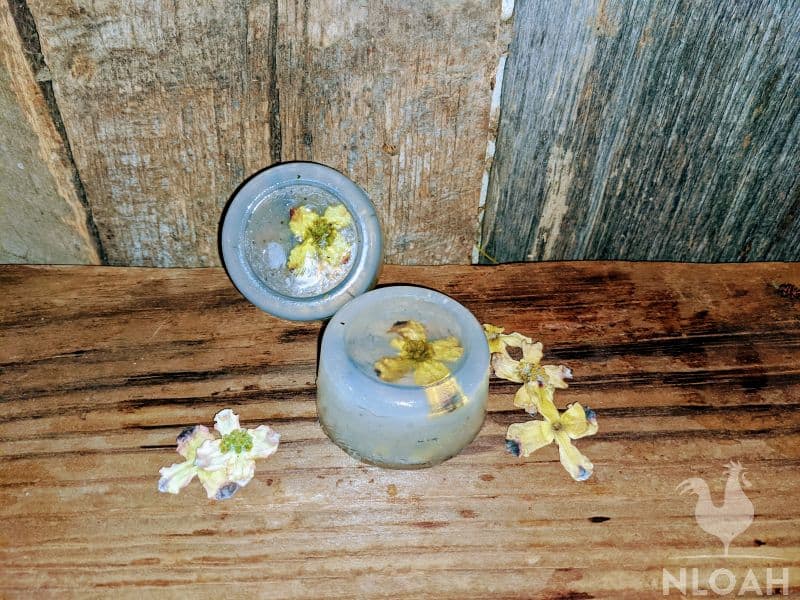
Make Your Own Soap
Soap Making is truly a lost art – but did you know you can even make your own homemade hand soap?
Identify Common Plant Diseases
Know which diseases are likely to affect your plants, and take steps to prevent and eradicate them. Corn smut is one common example.
Pick the Most Productive Egg Layers
When we first started raising chickens, we didn’t know what to look for in terms of breeds for eggs. But here are some great choices!
Sharpen an Axe Quickly
Know how to quickly sharpen your axe so you can get back to that huge pile of firewood.
Perfect Your Rabbits’ Diets
If you raise rabbits, you should put some time into learning what rabbits can and cannot eat. The list might surprise you!
Predator Proof Your Chicken Run
You already know how to predator-proof your chicken coop – here are some easy ways you can protect the run, too.
Harness the Power of Baking Soda
Baking soda has hundreds of uses on the homestead. It’s an awesome kitchen cleaner, among other things!
Harvest and Cook Some Edible Flowers
Flowers aren’t just pretty – they can also be edible! Here are some hacks on identifying the tastiest blooms.
Use Epsom Salts
Epsom salts are versatile and effective – here are some ways you can use them in the garden and other places on the homestead.
Build Electric Fences
Electric fences can be used to keep in all kinds of animals, from horses to pigs, and they are flexible, easy to move, and inexpensive.
DIY Your Dyes
If you’re going to make your own clothes or other crafts, you need some dye. Here are some easy ways you can make your own dyes.
Winterize the Garden
Here are some tips on how to take care of your garden for the rough winter ahead.
Know How to Dehydrate
Dehydrating food is a great way to preserve it for later seasons. Here’s a great list of foods you can prepare in your dehydrator at home.
Use a Clothesline
Clotheslines can save you money, energy, and time. Here are some other benefits.
Research Where to Buy the Healthiest Chicks and Other Livestock
Put some time into understanding how to identify the healthiest chicks, sheep, pigs, or whatever else it is you plan on raising on your farm. You’ll save yourself some serious headaches later on.
Consider Cold Stratifying Your Seeds
Cold stratifying seeds is a great way to boost your fruit harvests – and doing so is simple.
Grow Vegetables Indoors
If your outdoor space is limited – or you want to extend your harvest – consider growing a few vegetables indoors.
Make Your Own Makeup
Ditch the department store for good! Make your own makeup, like eye shadow, and you’ll save your money, and be able to avoid the most common chemicals found in cosmetics.
Use Borax
Borax has a ton of uses on the homestead. Consider stocking your homestead cabinets with this effective and versatile chemical.
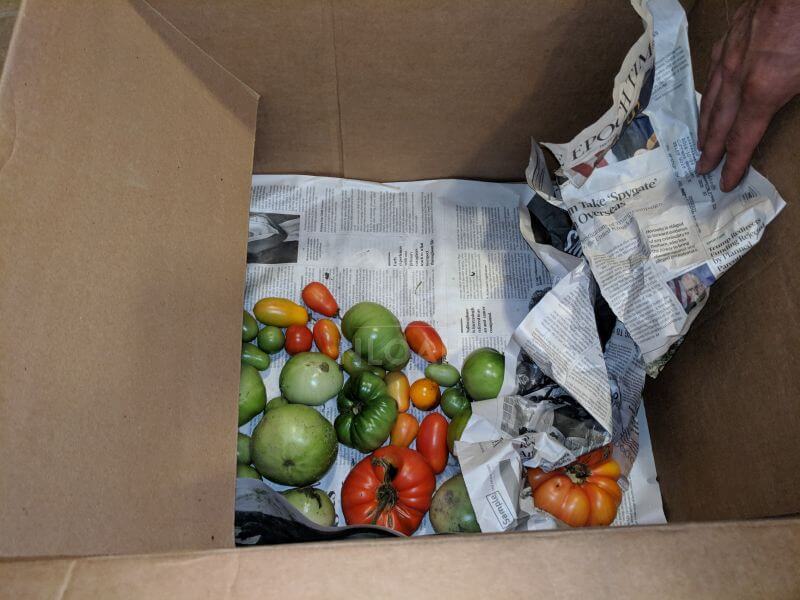
Ripen Green Tomatoes
Have a ton of green tomatoes at the end of this season? Use them up or know how to ripen them quickly.
Decide Whether It’s Really Right For You
I won’t sugarcoat it – homesteading can be tough! Whether you just want to have a few chickens or want to turn your homesteading lifestyle into a full-blown business, you’re going to need to put in a lot of long hours.
It’s a lot of physical labor, but it’s also a lifestyle that’s filled with joy. Make sure you’re ready to put in the hours to reap the rewards!
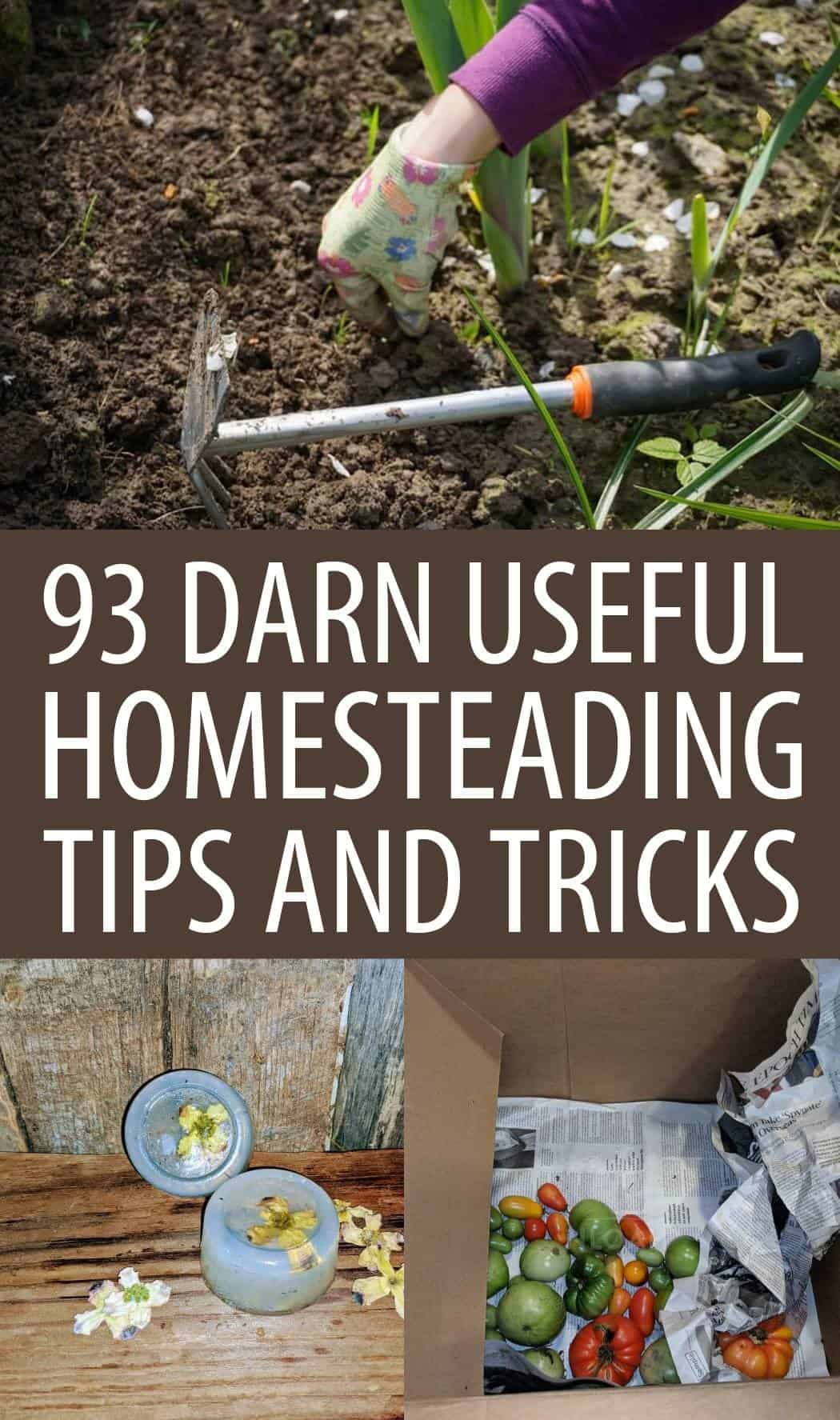

Rebekah is a high-school English teacher n New York, where she lives on a 22 acre homestead. She raises and grows chickens, bees, and veggies such as zucchini (among other things).
